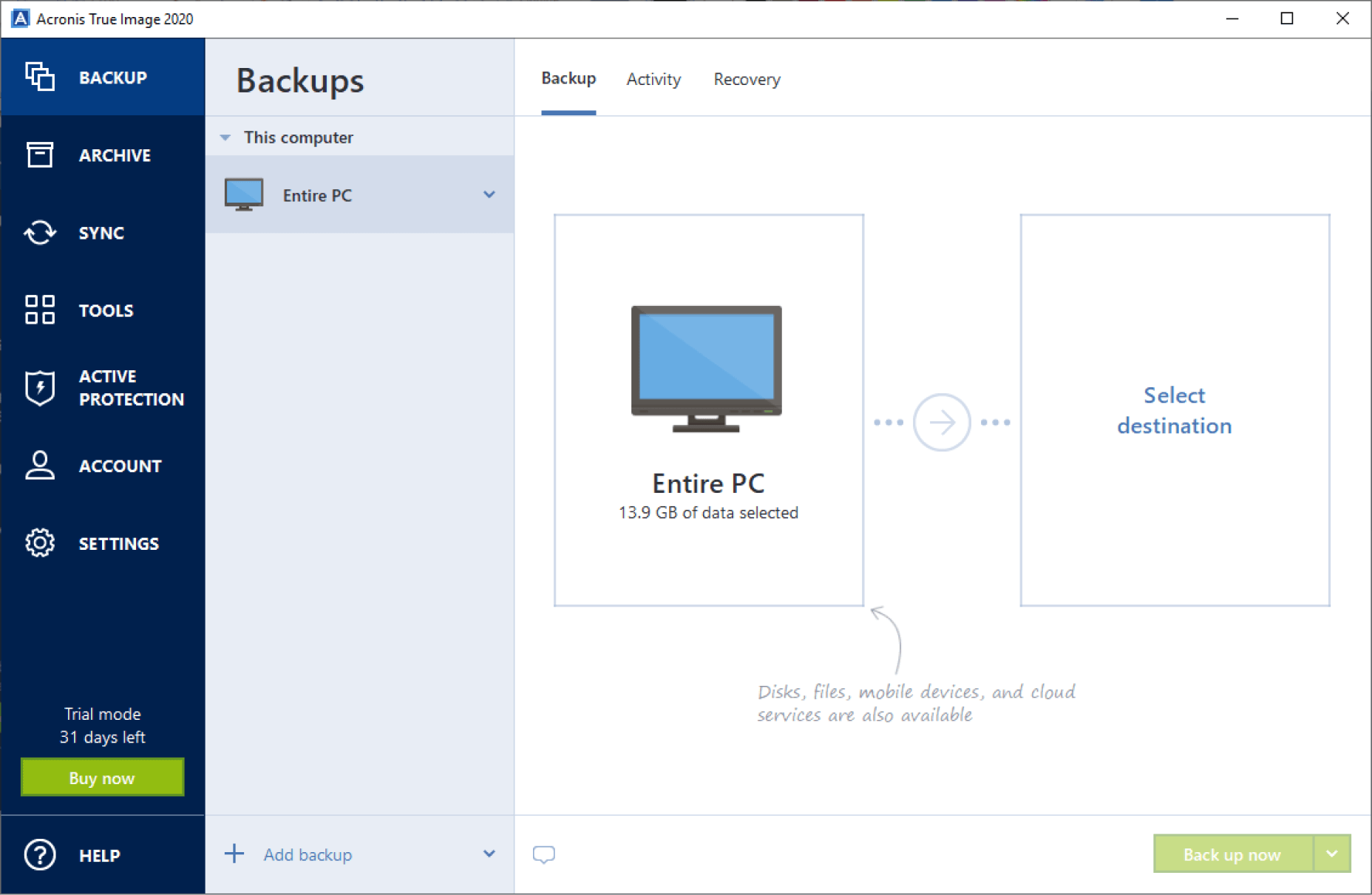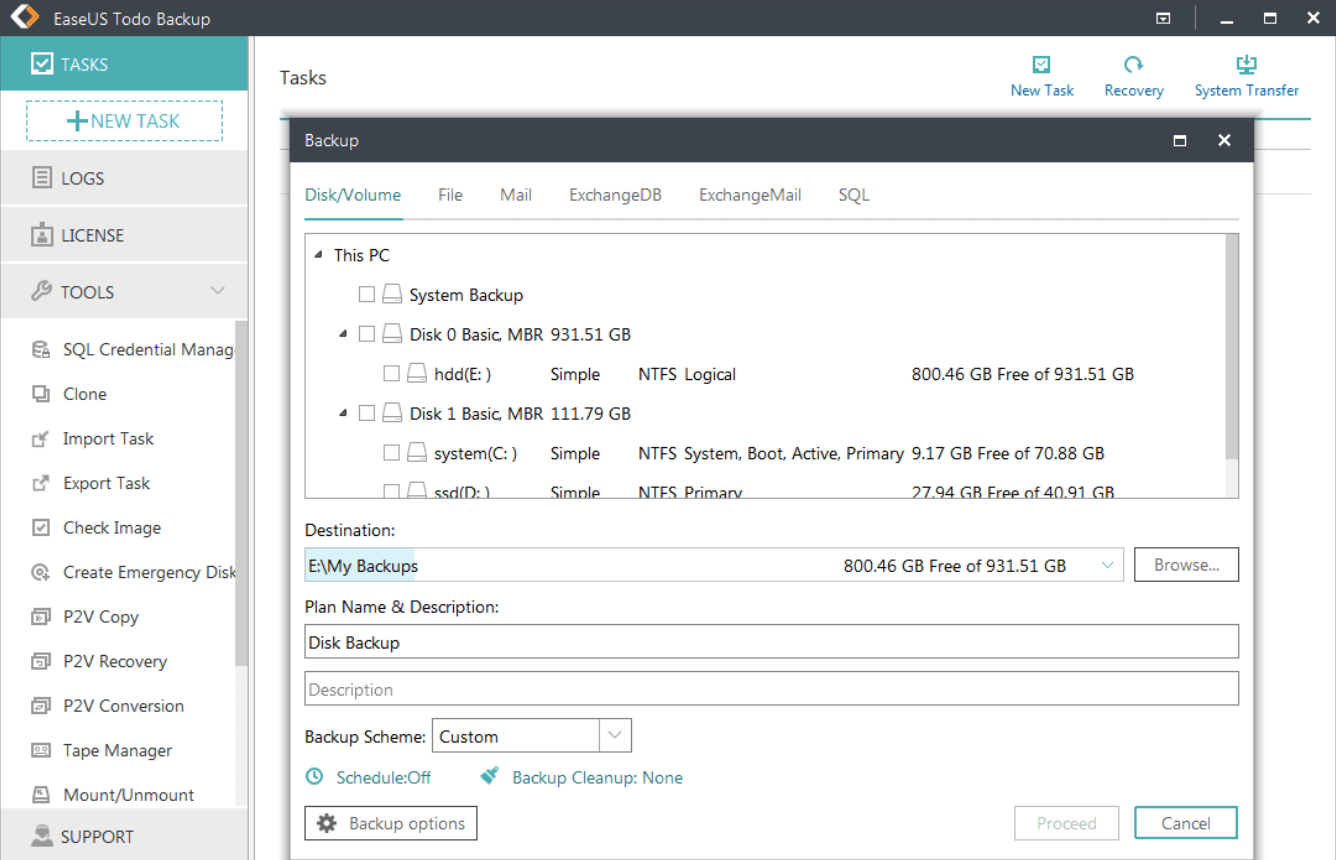Internet security and information safety is a growing concern in today’s business climate. Social media hacking and information scraping are rampant. Many experts claim that data is the new oil. It is getting sold to various entities with various interests. Also, some intend it for commercial use while others use it for political purposes. Thus, many feel it is high time to increase their security measures. One way for businesses to do this is by using high-security backup software.
Legacy backup software solutions add another layer of security by creating copies or versions of your data. They protect you from threats, such as ransomware and service interruptions. Meanwhile, modern backup software solutions of today add an extra layer of protection by including malware and ransomware protection protocols. Some even use artificial intelligence and machine learning to detect suspicious activities and nip them in the bud.
In this article, we’ll take a look at the features that make a backup software good. We’ll discuss the ideal benefits one would have by using this type of solution as well as some potential issues and trends in backup software usage. We hope that this inches you closer to learning more about these software and find the right solution for your needs.
What is Backup Software?
Backup software allows users to create multiple copies and versions of important digital information. Legacy backup solutions protect your data should accidents, user mistakes, natural disasters, and equipment failure happen. Usually, these software store your vital information, both in a physical hard drive on your premises and on the cloud. However, some solutions only support either on-premise or cloud backup storage.
As mentioned, advanced backup software solutions do not just create duplicates. They also provide extra security to prevent people with malicious intent from taking advantage of your data. These data can range from cloud-based ones to on-premise servers and hard drives. Moreover, many people equate backup software to what is deemed as disaster recovery tools. Just as the name suggests, they serve as insurance for the integrity of your information.
Additionally, there are many types of backup software solutions, and many deployments are intended for different kinds of users. Some backup tools are for personal and home use, while others are for business use. Also, the most advanced ones are designed for the use of large enterprises and organizations, ranging from financial institutions to government agencies.
List of Best Backup Software
In this section, we’ll present you with five of the top backup software solutions on the market today. Check them out below:
- Acronis True Image: A go-to backup platform for many organizations, this tool is considered as the best on the market. Its core features include mirror imaging, disk cloning, and all-in-one recovery drives. Furthermore, it allows you to retrieve files any time from your cloud backup as well as protect your files using AI by stopping ransomware and cryptojacking in real-time. For more sophisticated users, this mobile-ready software also offers a blockchain data notarization feature so you will know the transaction history of your data. Pricing starts at $59.99 for the one-time purchase Standard plan for individuals. There are also business plans available.
- EaseUS ToDo Backup: Another top backup solution, this offers security to all devices, including laptops, servers, and databases. It has different backup modes, including an email backup recovery and cloud backup. Core features include system transfers to another PC, disk cloning, OS migration to SSD/HDD, Windows and Mac compatibility, centralized backup management, event-based schedule backups, and a 16TB hard drive capacity. Additionally, it supports Microsoft Exchange and SQL backups. It can also integrate with other cloud systems, such as OneDrive, Google Drive, and Dropbox. Its home version is priced at $29.95. There are also enterprise plans available if you’re interested.
- StorageCraft ShadowProtect 5: A powerful and reliable backup solution featuring a patented VirtualBoot technology that can instantly boot a backup image into a virtual machine. It also comes with automation tools, so you can leave it to itself after you have set the rules and protocols. Moreover, this tool lets you run tests on your backup images so you can ensure that your backups will work should disaster befall you. Most importantly, it can help you migrate your whole system to a new machine without losing uptime at all. Whether you’re moving a physical or a virtual machine, ShadowProtect has you covered. You can also customize the solution to your needs. It is very flexible and can be deployed in a home environment or an enterprise. This is why it is only offered by quote.
- NovaBACKUP: A scalable backup software targeted at IT professionals and small businesses. It is engineered to help you keep your home or business information safe. Core features include virtual machine replication, single file restore, disaster recovery image backups, SQL and Exchange protection, and a choice for full, incremental, and differential backups. However, it only supports Windows and Linux devices. Moreover, it lets you have a hybrid setup with a mix of on-premise and cloud storage like most top apps. The platform integrates well with SkyDrive, OneDrive, Google Drive, and many others. Pricing starts at $49.95 per year.
- Cobian Backup 11: A good backup freeware created for businesses of all sizes. This solution may not look much at first glance. However, for normal users, it packs a wallop of a punch. It helps users make automatic backups for both files and directories. What’s more, you can choose to run it as a service or as an application. The platform allows you to store backup files in some other location, in the computer itself, on a certain network, or an FTP server of your choice. Moreover, it supports both compression and encryption. Thus, it provides you with important security options too. This goes over and beyond what usual freeware solutions do.
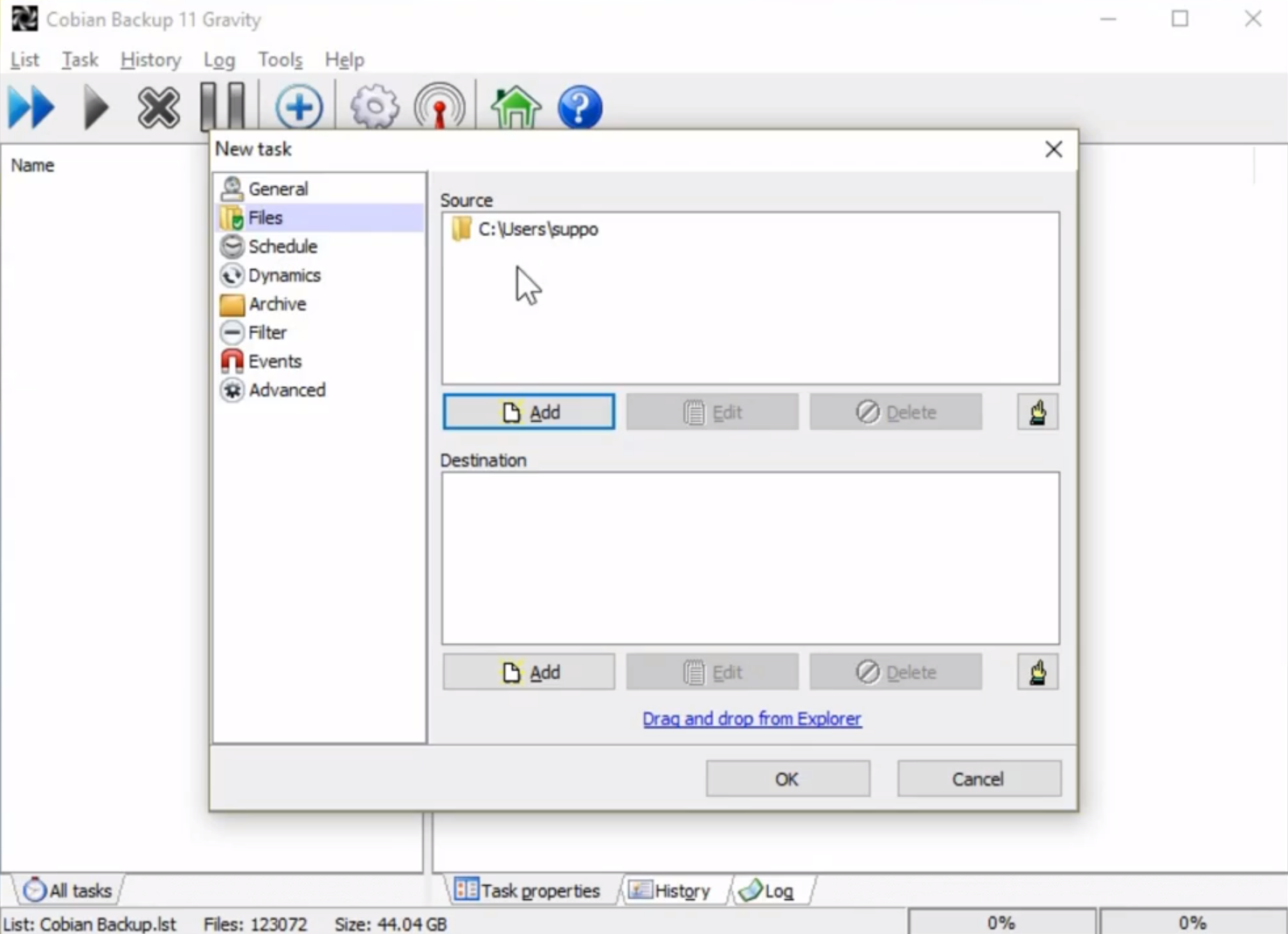
Cobian Backup 11 is a great example of a backup software because of its comprehensive set of features.
- Iperius Backup: This backup platform has many comprehensive features from disk image backups to cloud backups. Moreover, it seamlessly works with and backups Exchange and Office 365. Furthermore, you can backup data from software such as Oracle, MySQL, PostgreSQL, MariaDB, and SQL Server. Plus, you can set it to make automatic backups for you and even compress and encrypt your backup files. The platform can be deployed in many ways. Firstly, there is a free version for individual use. Secondly, there is the Imperius Desktop, a simple and reliable Windows 10 backup tool. Also, there’s the Imperius Advanced for physical workstations and servers. Paid plan pricing starts around $32 for one PC.
- Backup4all: This platform is touted as the one being used by the International Space Station. It has intuitive features ready to be used by beginners and it also comes with more advanced functionalities for professional users. With this, organizations and individuals can easily secure media files such as photos, research, documents, and other files. Core features include cloud-based backups, free backup plugins to restore program settings, using true incremental backup, email notifications, program security, and multiple destinations. The program comes in three editions: Professional, Standard, and Lite. Also, you need one license per computer. Paid plans start at $19.99 per license.
- Veeam: This tool provides you with the uninterrupted availability of your cloud, physical, and virtual workloads. With its easy-to-use management console, you’ll have features for backup, replication, and recovery on tap. Key features include fast recovery, file restorations, secure replications, cloud portability, smart storage, fast backups, and data reuse. It can backup workloads of all types from Exchange to Oracle Workloads. Also, your backups done with Veeam are 100% ransomware-protected. Veeam plan pricing starts from $420 per year for ten licenses.
- Carbonite: This platform offers three common types of protection from data loss: personal cloud backup, cloud backup for small business, and data protection solutions for enterprise-scale organizations. With these, you can recover clean files from the cloud when your on-premise ones were corrupted or affected by viruses or ransomware. What’s also great about Carbonite’s security protocols is that it subjects your files to advanced encryption whether they are “at rest” or “in-flight.” Thus, you can rest assured that they are safe in storage or in transit. Other important features include remote wipe, legal hold, location tracking, data migration, and good seven-day customer support. Product pricing starts at just $6 per month.
- FBackup: Another go-to application for freeware enthusiasts, this completely free solution has an easy-to-use interface with a backup wizard to guide you to create your backups. Key features include automatic backups, zip compression, automatic updates, cloud backups, backup plugins, backup catalog file, restore wizard, and ransomware protection. It also boasts of four million users. The most current version, as of writing, was released on February 3, 2020. It is called Version 8.5.272. And, of course, it comes for free.
Key Features of Backup Software Solutions
When you take a look at all the backup tools available on the market, you’ll find general features that make them well-designed. These features make certain products the go-to solutions for many people. Here are some of them:
Accurate File Copying
There is no use for a backup software tool if it cannot create identical copies of your files. Thus, top software providers make sure that their products duplicate files as advertised. So, when you look for a solution for your organization or home, find products that have verification modules. This module tests every copy being made to see if there are no corrupt file regions and if every copy is an identical file or a real backup. Usually, this module checks the files before and after the transfer was made.
Scheduling and Automation
Decades ago, users had no choice but to backup files manually. However, as backup software matured and as demand for convenience increased, good backup systems eventually let you schedule your backup sessions and do it themselves. Usually, most of the software available today have this feature. This is a big help to companies as it saves time.
Security
Good backup software solutions provide extra layers of security. The best of them have security protocols over the software as well as backup directories. Moreover, there are solutions out there that provide you with the capability to encrypt your files. It is also common for software providers to include permission options for administrators to tinker with.
Types of Backup Software
There are three common types of backup tools. However, in today’s market, many software suites roll all of these types into one comprehensive product.
-
- File-based data backup. The most common type of backup tool, a file-based data backup system, operates in a level of file systems, allowing you to process files and folders that are platform-independent. However, this may not be enough if you want to backup your whole operating system.
- Image-based backup. This type, on the other hand, creates an image or a snapshot of your operating system and all its processes to save its current state. This is useful when you want to restore your system version or compare changes through time. It can also copy your computer or external hard drive sector by sector. Thus, you can protect everything from system settings to boot information.
- File sync. This helps you synchronize the content and states of multiple files stored in different locations. For example, you may work on a file on your desktop, but it also saves a copy almost instantaneously on the cloud. Most file-based data backup systems have this feature today.
Benefits of Backup Software
There are many benefits to adopting a backup software solution. These apply to both home and business use. However, specific benefits depend upon your specific usage of the product. Also, they depend on what product you actually use. In this list, we’ll only include the general ideal benefits that one can get.
- Never lose a file
- Save version histories easily
- Connect and sync all files stored in the cloud and on your hard drive
- Save system information for system restore
- Run system using a virtual machine in times of disasters
- Add extra layers of security with encryption and built-in security tools
Other Factors To Consider When Purchasing Backup Software
Of course, features and capabilities are the number one thing to consider when purchasing a backup software solution. However, there are other things to take into account:
Security
As mentioned before, this is a big issue when it comes to backing your files up. You want your files to be secured, especially when you can access it using simple authentication procedures. Passwords can be easy to hack, especially if users have easy-to-remember passwords. Thus, you want a solution with extra layers of security. Many top products out there have malware and ransomware protection capabilities. So, make sure your software of choice has additional security features.
Ease-of-use
There is no point in deploying a product that is very hard to use. Thus, you need to look for a solution that is high in usability relative to the preferences and skills of your prospective users. So, you should look for a solution with clean visuals and easy controls. You should also consider others in your team as well. This is especially so when your team is not so technologically-savvy.
Pricing and Packages
Another important thing to consider is if you are getting the right pricing package for you. You don’t want to have something with features that you won’t be needing. Moreover, you don’t want a solution or a package that lacks essential features. Thus, before you buy, you should do a deep dive into the solution. You can do this by reading reviews, knowledgebase articles, and even signing up for free trials.
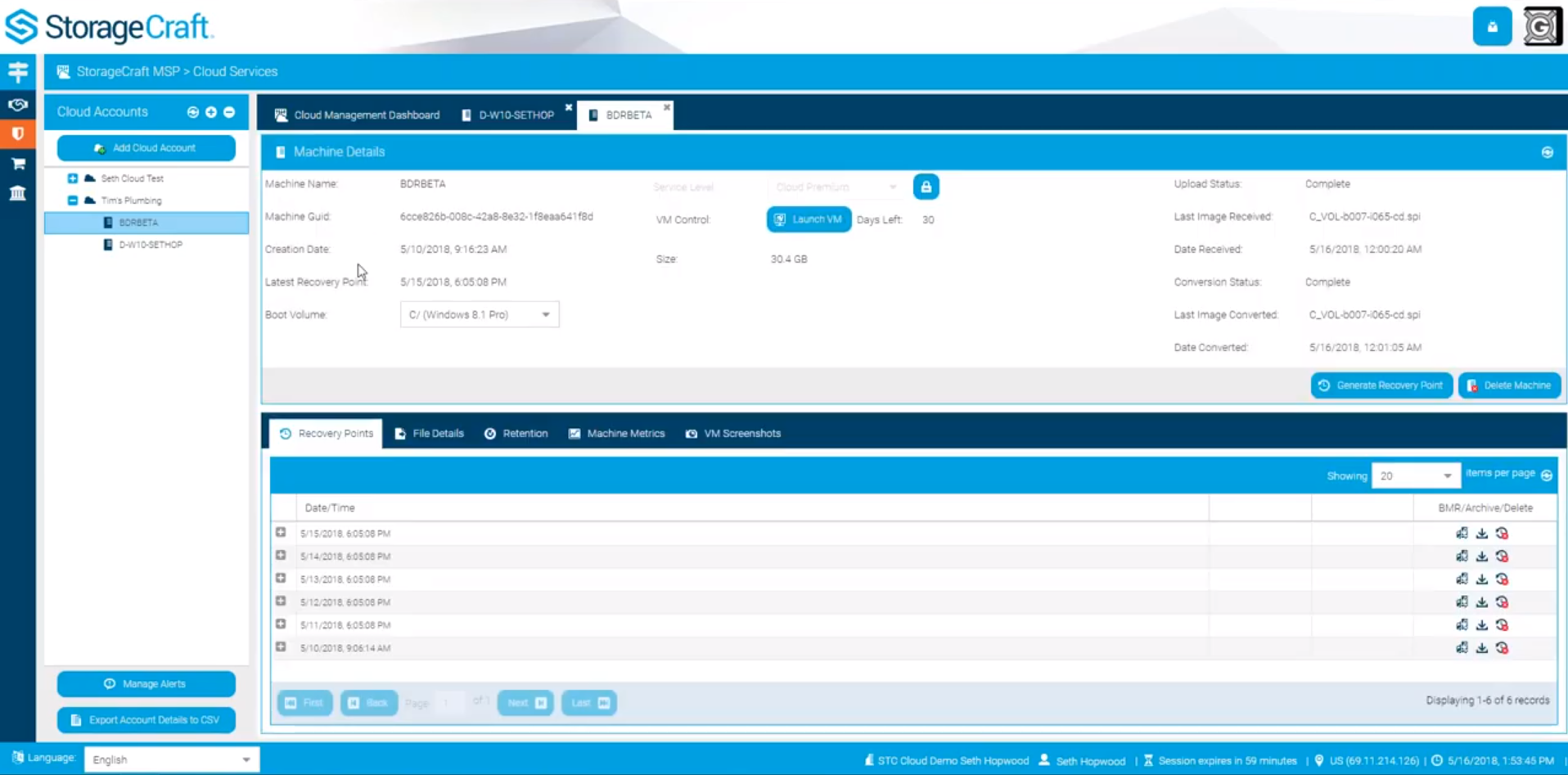
StorageCraft ShadowProtect 5 provides you with not only easy-to-use backup features but also robust security options at reasonable rates.
Potential Issues with Backup Software Adoption
No matter what tool you are adopting for your business processes, you have to expect to run into issues. This is because learning and rolling out the software are just a part of the implementation process. The people who are taking part in the process have more weight when it comes to adoption success. Thus, you must expect issues arising from both software and software usage.
Bad backups
Sometimes, people get bored when they back up their files and images. Thus, they cut their backups short, thinking that it won’t affect it that much. However, this doesn’t just create corrupted files. This may also come back to bite you once you need to run an incomplete image file on your virtual computer.
Takes time and money
You need to make full backups once a week if you use tape backups. This takes a lot of time, as mentioned. Your backups will also be quite heavy files. So, you may need more hardware to keep your backups safer. Thus, you should be open to the possibility that you will spend more time and money to keep your files safer.
Obsolescence
There’s natural, technological obsolescence when advances in technology render applications not so useful anymore. Thus, to get the best service out there, you need to update your software or even switch to another. And, when you are switching or upgrading, there will be times where the newer version or app won’t match your current setup. So, watch out for and be ready for these changes. Despite this, top backup software solutions are scalable and very flexible.
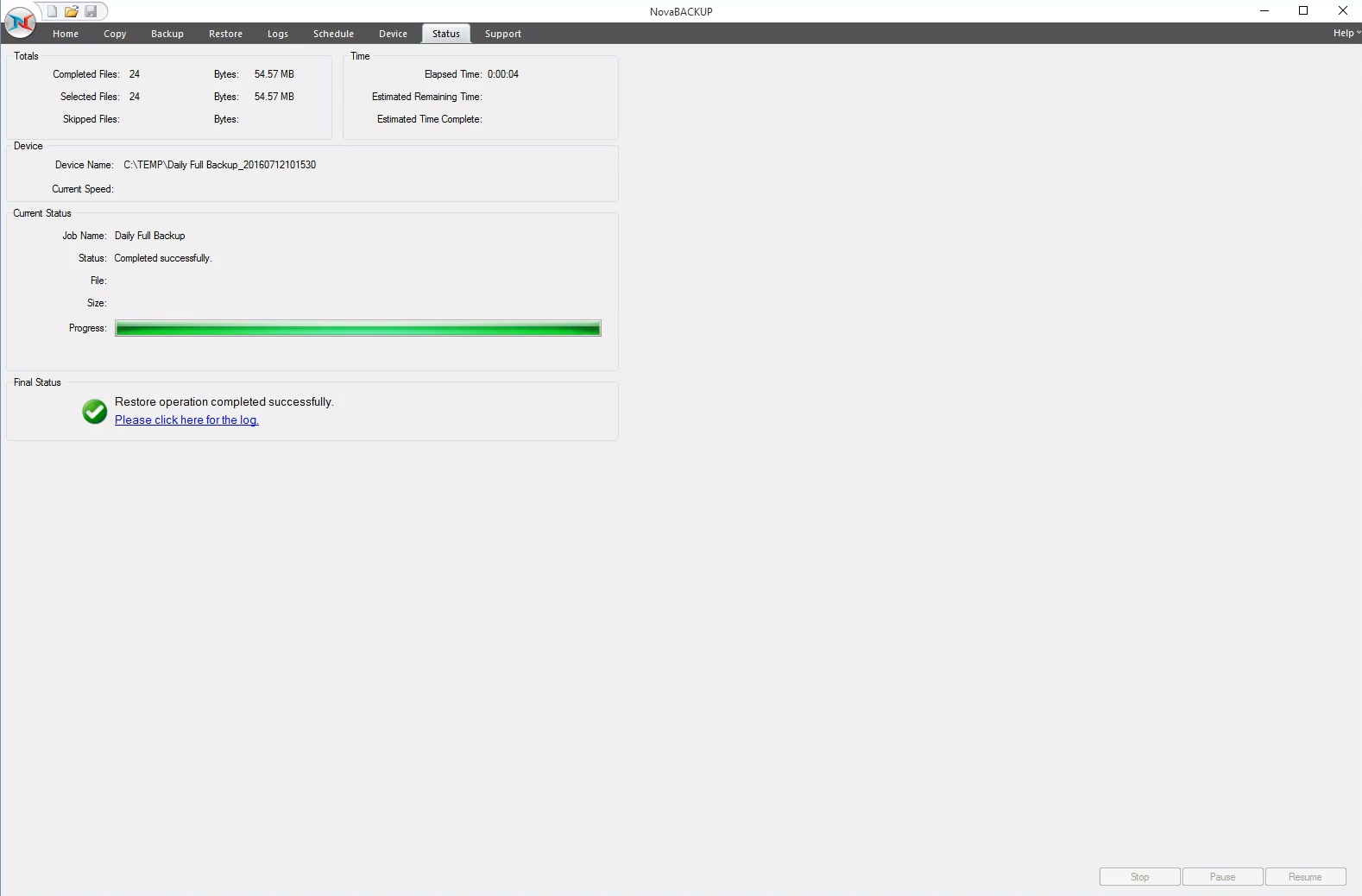
Novabackup is flexible enough to withstand industry changes so you can be sure that it can handle whatever backup requirements you have.
Latest Trends In Backup Software Usage
The latest trends in backup software usage are: (1) security is getting top priority, (2) automated storage tiering becomes more ubiquitous, (3) smart deduplication processes are in demand.
Firstly, through cloud storage and computing, backups no longer have to be dependent on your available physical hardware. However, this poses a great danger when it comes to theft. Both clients and backup software service providers understand this. Thus, both are finding ways to make services and the practices surrounding them more conducive to higher security. In the coming years, we expect more tools and business practices to result from this urge to be more secure.
Secondly, automated storage tiering is getting more popular. This is because backups also declutter high-speed systems. Thus, they don’t only reduce storage costs but also improve performance. Products with automated storage tiering store your data in tiers to increase your performance and keep within capacity requirements.
Thirdly, smart deduplication is getting more critical for many firms. Multiple duplicates take so much space. Also, making sure there are no duplicates manually takes too much time. Thus, more and more users demand a smart deduplication module in their backup software to reduce storage costs and keep their platforms efficient.
So, before purchasing a platform, make sure that it is future proof and can accommodate these trends as well.

